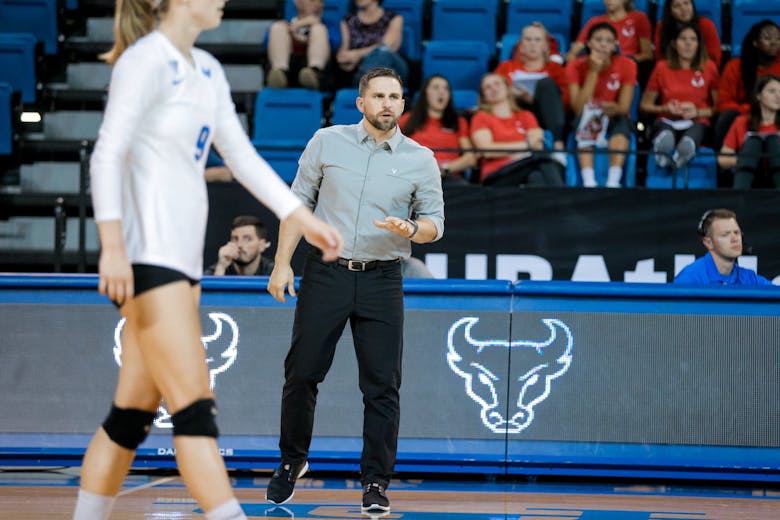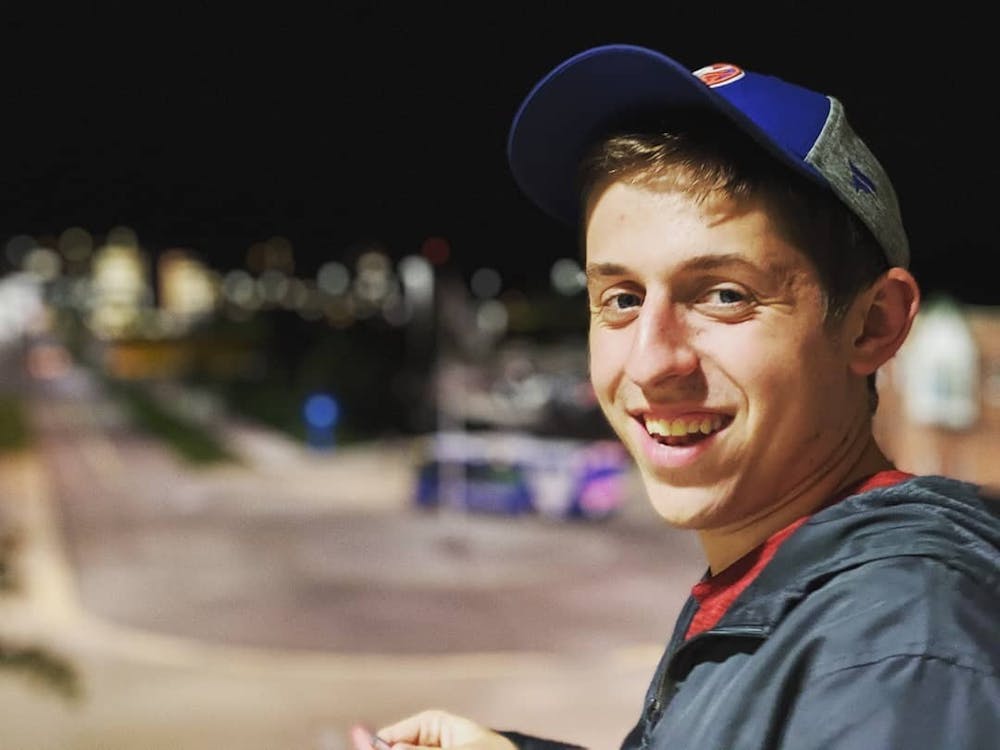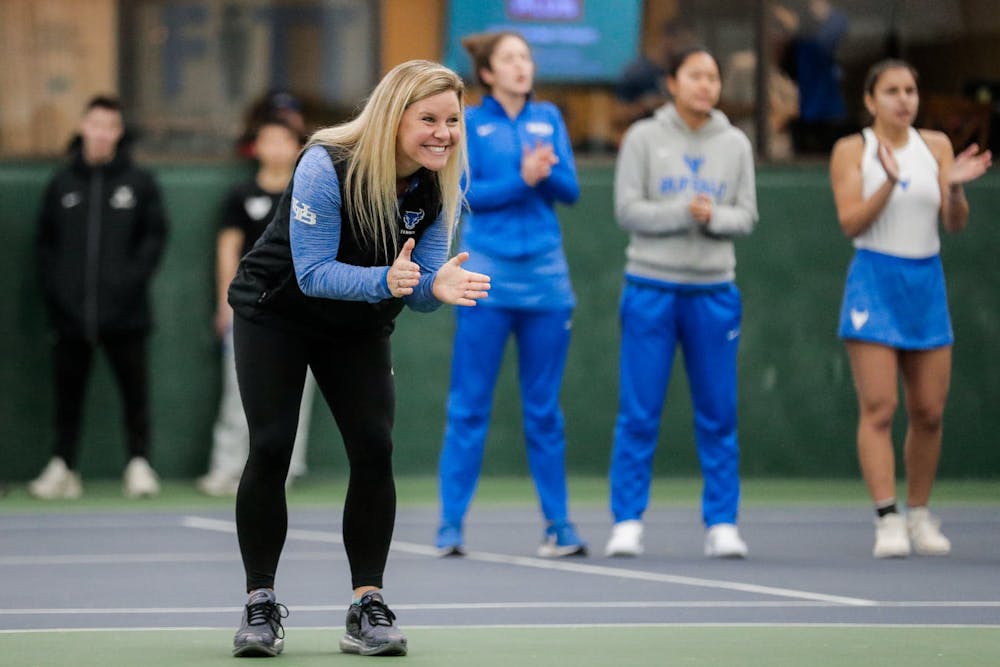Kristen Maines knew something was coming — she just didn’t know what it was.
On March 12, the women’s tennis coach led her team in a scheduled practice at the Miller Tennis Center. But at the same time, leaders from the Mid-American Conference were discussing how COVID-19 would impact their ability to hold future competitions.
As practice came to a close, nobody on the team knew what would come of their season.
A few hours later, they got their answer.
In a midday press conference, commissioner Jon Steinbrecher announced the cancelation of all spring sport seasons. The team was gutted.
“It was tough,” Maines said. “You’re talking about going from a match per weekend to a season being gone and players not getting their eligibility. To have those things taken away so abruptly, it’s obviously been a struggle for the student-athletes and everybody involved in this whole process.”
The decision caused immediate logistical hurdles for all the affected players. But it also impacted the heart of each team. At a time when everyone is trying to adapt to a new reality, so too are coaches. In 2019, UB Athletics had 12 head coaches and 38 assistant coaches on its payroll. All of them have been forced to adapt to changes to their working habits. For all the affected coaches, COVID-19 has altered how they communicate with their teams, how they work around an NCAA “dead period” for recruiting, how they teach skills despite being in remote locations and how they prioritize certain things like empathy and compassion.
Maines, in particular, is in a unique situation because all nine of her student-athletes are from outside the U.S.
“With my team being so international, my concern for them was that they needed to get home to their families,” Maines said. “I don’t want them to be here in a different country — the university and myself would of course take care of them and be there for support –– but you need to be with your families during this situation. So my concern was, how are we going to get them home as soon as possible?”
Maines spent the next few days furiously trying to reunite her student-athletes with their families. In the end, she was successful: within 48 hours, the entire team had gone home, except for one athlete, who had chosen to go to Toronto to join her relatives there.
But for Maines and her fellow coaches, reuniting student-athletes with their families was just the first step in working under a rapidly changing situation.
“It’s just total upheaval,” Maines said. “Everything is upside down right now. This is typically our main season. We would be training, we would be in the gym, we would be putting in the extra work right now. This is go-time for us. This is a time I usually don’t see my family, and that’s tough — I’m on the road, this is mommy’s busy time. And now we’re all home.”

UB’s second-year volleyball coach Scott Smith coaching a game.
Scott Smith, UB’s second-year volleyball coach, says he has “not been a part of anything like this” before, but that the team is learning “how to best communicate with each other.” He says he’s been focused on finding new approaches to coaching and is taking advantage watching films and interacting with the rest of the athletics department.
“I’m still putting in a 9-to-5 day,” Smith said. “I wake up and I get to work answering emails, touching base with different players that I would normally have a meeting with. We get on the phone, or we get on a Zoom call. We’re still in touch with our support staff.”
Smith has stressed the importance of remaining mentally sharp during this time, allowing his student-athletes to focus on a “theoretical” approach rather than holding physical practices.
“The parts where we would be holding practice, or we would be planning for matches when we’re in season — those have shifted more to planning out mentality sessions, where we get to focus on different mental strategies to deal with stress, being adaptable, setting up good time management skills and really strengthening our communication skills within our team,” Smith said.
Division-I athletes are accustomed to a structured schedule: classes, team meetings, lift sessions, practices, competitions and anything else that comes along with playing their sport at a high level. So for coaches like Smith and Maines, providing a day-to-day structure is a priority.
“That’s been the main focus here, trying to help them come up with strategies to provide structure to their day,” Smith said. “So much of being a student-athlete is trying to balance D1 athletics and a rigorous academic schedule. We want to make sure they’re setting a workspace where they can focus.”
Maines has helped her student-athletes adjust to taking their classes remotely by working with UB to address the time-zone difference — a class that begins at 7 p.m. EST would force a student in Bucharest to wake up at 2 a.m. locally.
“They are student-athletes,” Maines said. “For every student — whether you’re a student or an athlete — this is a huge transition, an upheaval of everything that you have known to this date in terms of classes and the college experience. My main focus for them has been making sure they are understanding the remote learning, helping them if they have any issues with that.”
Both coaches say they are fortunate to be in desirable recruiting situations. Maines has only one graduating senior on her team and she filled that spot in the fall recruiting period. She also doesn’t have any juniors, so the next class she has to fill is in 2022. Smith says he is “pretty much done recruiting” junior and senior classes, so the team is “in a little better situation than many other D1 programs are, who are still trying to fill those classes.”
Smith says he is focused on staying productive, even in these tumultuous times.
“These past few weeks have been different, getting used to what everyone is calling a ‘new normal,’” Smith said. “This is probably my third week working from home, but we’ve been keeping at it, staying on that grind. We’re trying to create a good work environment, so I can still stay productive and stay in touch with the team as much as I possibly can.”
For Maines, this situation has been all about perspective, and making the most of it.
“When we look back in future years, I think we are going to be more grateful and take more advantage of every opportunity,” Maines said. “The girls who are experiencing this right now — especially the freshmen, sophomores and juniors — will have a deeper appreciation for how fortunate we are as a group and as a team to have and support each other, and to be able to play the sport we love on a daily basis.”
Justin Weiss is the senior sports editor and can be reached at justin.weiss@ubspectrum.com

Justin Weiss is The Spectrum's managing editor. In his free time, he can be found hiking, playing baseball or throwing things at his TV when his sports teams aren't winning. His words have appeared in Elite Sports New York and the Long Island Herald. He can be found on Twitter @Jwmlb1.





